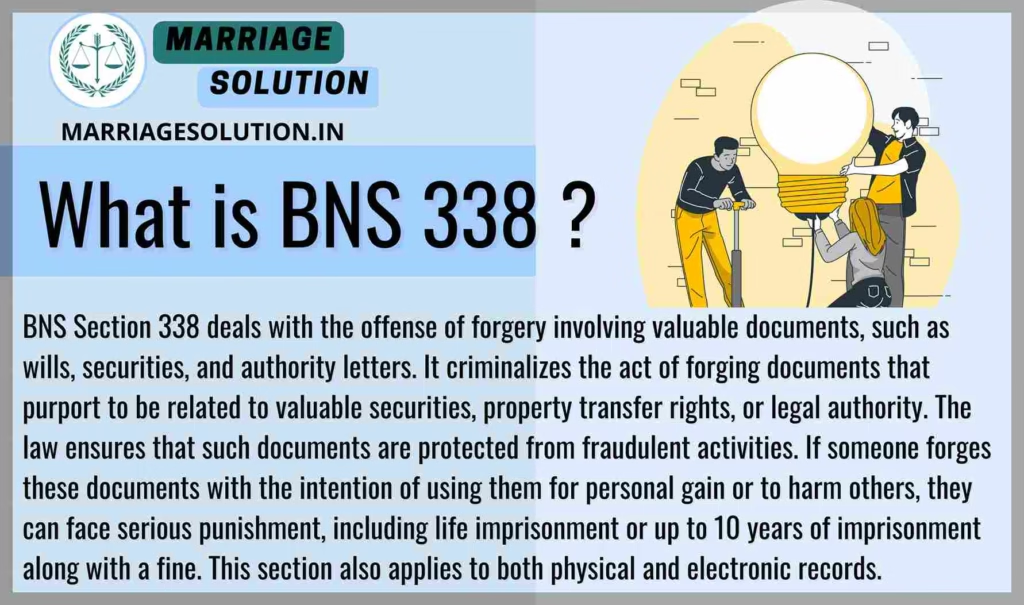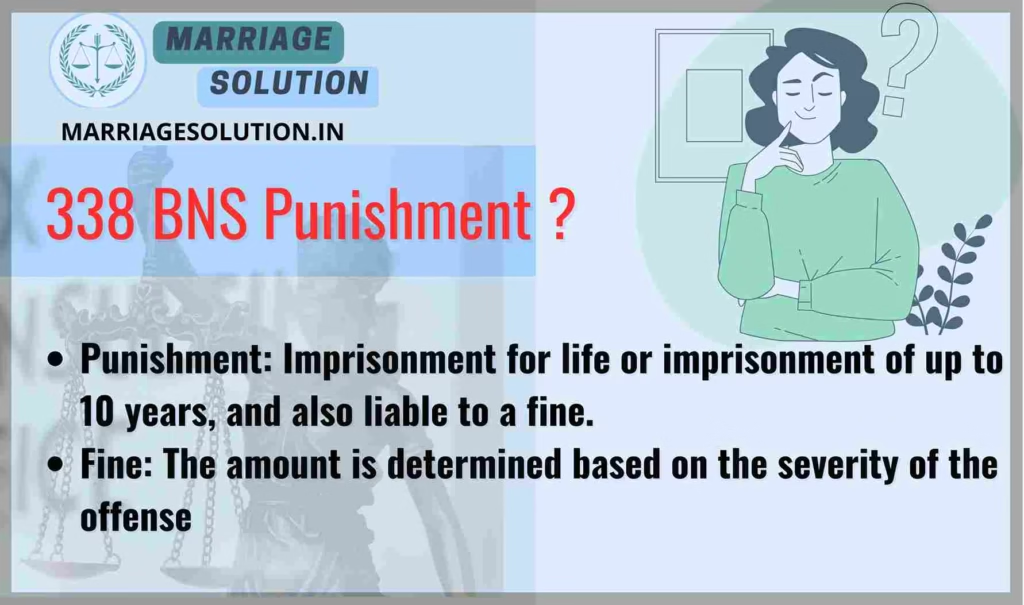Introduction of 338 BNS
338 BNS deals with the forgery of valuable securities, wills, and other legally significant documents. Such documents often hold financial or legal authority, and their falsification can cause serious harm to individuals, families, or institutions. This section ensures strict punishment, including life imprisonment or imprisonment up to 10 years with a fine, for those who attempt to forge critical records. By covering both physical and electronic records, BNS 338 reflects India’s commitment to protecting the authenticity of documents in both traditional and digital contexts.
The Bharatiya Nyaya Sanhita (BNS) Section 338 replaces the old Indian Penal Code (IPC) Section 467.
What is BNS Section 338 ?
BNS Section 338 deals with the offense of forgery involving valuable documents, such as wills, securities, and authority letters. It criminalizes the act of forging documents that purport to be related to valuable securities, property transfer rights, or legal authority. The law ensures that such documents are protected from fraudulent activities. If someone forges these documents with the intention of using them for personal gain or to harm others, they can face serious punishment, including life imprisonment or up to 10 years of imprisonment along with a fine. This section also applies to both physical and electronic records.

BNS 338 in Simple Points
“Whoever forges a valuable security, a will, or any document giving authority to transfer property, adopt a child, or to receive money or valuable securities, shall be punished with imprisonment for life, or with imprisonment which may extend to ten years, and shall also be liable to fine.”
1. Meaning of Forgery of Valuable Security, Will, etc.
Forgery under Section 338 involves creating or altering critical documents with the intent to cheat, defraud, or gain undue advantage.
- Valuable security includes bonds, shares, promissory notes, or other financial instruments.
- Wills are documents that determine distribution of property after death.
- Forgery also covers legal authority documents such as adoption papers or receipts of property.
Example: Creating a fake will to claim someone’s property.
2. Who is Covered?
This section applies to:
- Individuals → forging financial instruments or wills for personal benefit.
- Groups/Organizations → involved in large-scale financial scams using forged documents.
- Professionals → misusing entrusted documents like lawyers or brokers preparing false wills, deeds, or securities.
3. Types of Documents Covered under BNS 338
- Valuable Securities – bonds, promissory notes, share certificates.
- Wills – property distribution after death.
- Authority Documents – legal papers allowing property transfer or adoption.
- Receipts for Movable Property – financial receipts used for proof of ownership or delivery.
- Government Promissory Notes – special case, treated as cognizable.
4. Nature of the Offense
- Punishable with Life Imprisonment or imprisonment up to 10 years + fine.
- Non-Bailable → Bail is not a right; court discretion is needed.
- Non-Cognizable → Police need magistrate approval to investigate, except in government securities forgery.
- Trial by Magistrate of the First Class.
5. Punishment under BNS Section 338
- Forgery of valuable security or will → Life imprisonment or up to 10 years imprisonment + fine.
- Forgery of adoption or property transfer authority → same punishment applies.
- Special case: Government promissory notes → treated more strictly (cognizable offense).
6. Examples of BNS Section 338
- Example 1 – Forged Will:
Ravi forges his uncle’s will to claim ownership of farmland. He can face life imprisonment under BNS 338. - Example 2 – Forged Security:
Mohan creates a fake Central Government promissory note to get money. This is a cognizable, non-bailable offense under Section 338. - Example 3 – Forged Adoption Paper:
A person fabricates adoption papers to unlawfully claim guardianship of a child. This act falls under Section 338 as forgery of authority documents.
7. Importance of BNS Section 338
- Protects property rights and inheritance from fraudulent claims.
- Safeguards the integrity of financial markets and securities.
- Upholds public trust in legal documents.
- Prevents misuse of authority papers, wills, and adoption rights.
Section 338 BNS Overview
BNS Section 338 addresses the crime of forging valuable documents like wills, securities, and authority letters. It ensures protection against fraudulent acts involving financial and legal documents. The law imposes severe penalties, including life imprisonment or imprisonment up to 10 years with a fine, to deter misuse of such documents. It applies to both physical and electronic records to combat modern forms of forgery. This section ensures the authenticity of critical documents and safeguards public trust in legal and financial transactions.
BNS 338 : 10 Key Points
1. Forgery of Valuable Securities
Valuable securities include financial documents like bonds, promissory notes, or shares. Forging these documents can lead to severe financial fraud, misappropriation of funds, or loss to the rightful owner. The law under BNS Section 338 aims to protect the authenticity of such financial instruments, ensuring trust in economic transactions.’
2. Forgery of Wills
Wills are critical legal documents that dictate the distribution of assets after a person’s death. Forging a will can lead to disputes among heirs, unjust enrichment, and legal chaos. Section 338 safeguards the validity of wills, ensuring that the wishes of the deceased are honored and not altered fraudulently.
3. Forgery of Authority to Adopt
This section also applies to documents that grant authority to adopt a child. Forging such documents can lead to unlawful adoptions, emotional trauma, and disputes over parental rights. By addressing this issue, the law upholds the sanctity of adoption processes and ensures children’s welfare is not compromised.
4. Forgery of Financial Authority Documents
The section covers the forgery of documents that authorize the handling of money or securities, such as receipts for payment or delivery of movable property. These documents are often relied upon in legal and financial matters. Forging them can lead to monetary loss or fraud, which this provision aims to prevent.
5. Punishment for Forgery
The section prescribes severe punishments for offenders. Those found guilty can face life imprisonment or imprisonment for up to 10 years, along with a fine. The harsh penalties emphasize the seriousness of the offense and act as a deterrent to potential forgers.
6. Classification of the Offense
Forgery under this section is classified as non-cognizable, meaning police need magistrate approval to investigate. It is also non-bailable and non-compoundable, ensuring strict legal scrutiny. Cases are tried by a Magistrate of the First Class, ensuring proper judicial oversight.
7. Special Case: Promissory Notes of the Central Government
If the forged document is a promissory note issued by the Central Government, the offense becomes cognizable, meaning police can directly register and investigate the case. The penalties remain the same, but the classification underscores the seriousness of tampering with government-issued securities.
8. Protection of Public Trust
This section protects public trust in financial and legal documents. By penalizing forgery, it ensures that people can rely on the authenticity of important records without fear of deception or fraud, fostering confidence in administrative systems.
9. Safeguarding Property Transactions
Documents related to the transfer of money, securities, or property are also protected under this section. Forging these documents can disrupt property transactions, leading to disputes and financial losses. The law ensures that such fraudulent acts are punishable to maintain fairness in transactions.
10. Inclusion of Digital Records
With the rise of digitalization, the section also applies to electronic records, making it relevant in the modern age. This ensures that forgery of digital financial instruments or authority documents is treated with the same seriousness as physical records, promoting digital security and accountability.
Examples of BNS Section 338
- Forgery of a Will
An individual creates a fake will to falsely claim the property of a deceased relative. This falls under BNS Section 338, as it involves forging a document of legal significance. - Forgery of Promissory Notes
A person forges a promissory note issued by the Central Government to gain financial benefits. This act is cognizable and non-bailable under BNS Section 338.
BNS 338 Punishment
- Punishment: Imprisonment for life or imprisonment of up to 10 years, and also liable to a fine.
- Fine: The amount is determined based on the severity of the offense

BNS 338 bailable or not ?
BNS Section 338 is non-bailable in most cases. However, if the forged document is a promissory note issued by the Central Government, it becomes cognizable and is still non-bailable. This means that the accused cannot secure bail immediately in most cases involving this offense, and the matter will be tried in a Magistrate’s court.
Bharatiya Nyaya Sanhita Section 338
| Law | Offense | Punishment | Bailable / Non-Bailable | Cognizable / Non-Cognizable | Trial By |
|---|---|---|---|---|---|
| BNS Section 338 | Forgery of valuable documents such as valuable securities, wills, instruments authorizing transfer of property, adoption authority, or receipts for movable property. | Life imprisonment, or imprisonment up to 10 years, and fine. | Non-Bailable | Non-Cognizable (except forgery of central government promissory notes — cognizable) | Magistrate of the First Class |
| IPC Section 467 (Old) | Forgery of valuable security, will, or any document required to be attested which is of high legal or financial importance. | Life imprisonment, or imprisonment up to 10 years, and fine. | Non-Bailable | Non-Cognizable (special cases involving government securities treated strictly) | Magistrate of the First Class |
BNS Section 338 FAQs
What is the punishment under BNS Section 338?
Punishment includes imprisonment for life, or imprisonment of up to 10 years, and also liable to a fine.
Is BNS Section 338 a bailable offense?
No, BNS Section 338 is a non-bailable offense, ensuring serious scrutiny of the accused.
What types of documents are covered under BNS Section 338?
It includes documents like valuable securities, wills, authority to adopt, promissory notes, and financial or legal authority documents.
What does non-cognizable mean under BNS Section 338?
Non-cognizable means police need prior approval from a magistrate to investigate, except for government promissory notes, which are cognizable.
Who tries cases under BNS Section 338?
Cases are tried by a Magistrate of the First Class, ensuring judicial oversight.
Does BNS Section 338 include electronic records?
Yes, electronic records of securities or authority documents are included under BNS Section 338 to address digital forgeries.
Conclusion
BNS Section 338 is a vital safeguard in the legal framework, ensuring that wills, financial instruments, and valuable authority documents cannot be misused through forgery. With its provision for severe penalties, the law protects public trust, secures property transactions, and prevents fraudulent claims. By including digital records, it also addresses modern threats like electronic forgery, ensuring comprehensive protection in today’s world. In short, BNS 338 strengthens both personal rights and institutional credibility by upholding the integrity of valuable documents.
Need Legal Support?
If you are dealing with court cases, marriage problems, or any other legal issue, our team at Marriage Solution – Lawyer Help is here for you. Simply fill out our quick online enquiry form, and we’ll connect you with the right legal expert to support your needs.
Finished with BNS 338 ? Continue exploring the next provisions of the Bharatiya Nyaya Sanhita (BNS), 2023. Each section includes explanations, examples, and plain-language breakdowns for easy understanding.
- 339 BNS :Having possession of document described in section 337 or section 338, knowing it to be forged and intending to use it as genuine.
- https://marriagesolution.in/bns_section/339-bns/
- 340 BNS : Forged document or electronic record and using it as genuine.
- https://marriagesolution.in/bns_section/340-bns/
- 341 BNS : Making or possessing counterfeit seal, etc., with intent to commit forgery punishable under section 338.
- https://marriagesolution.in/bns_section/341-bns/
- 342 BNS : Counterfeiting device or mark used for authenticating documents described in section 338, or possessing counterfeit marked material.
- https://marriagesolution.in/bns_section/342-bns/
- 343 BNS : Fraudulent cancellation, destruction, etc., of will, authority to adopt, or valuable security .
- https://marriagesolution.in/bns_section/343-bns/
Full IPC Section List: https://marriagesolution.in/ipc-section-list
All Indian Law & Blogs: https://marriagesolution.in/indian-law/
Full BNSS Section List: https://marriagesolution.in/bnss_section-list
